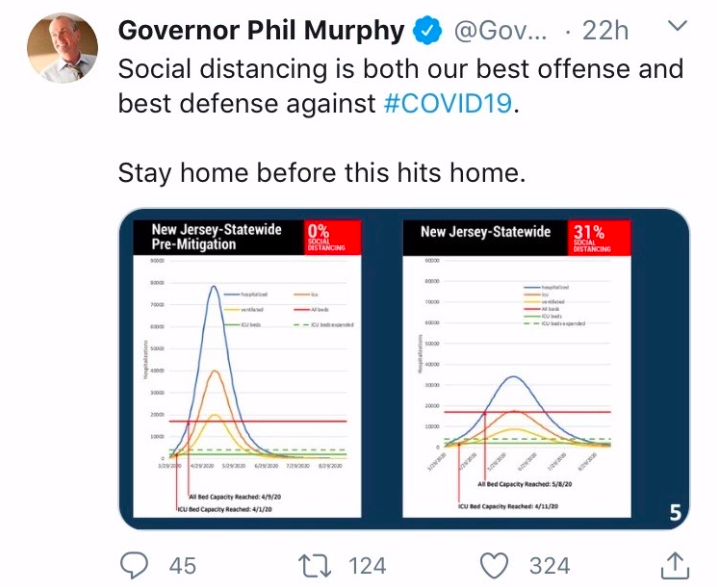Is six feet really too much to ask?
Photo @GovMurphy
Tweet from Governor Phil Murphy encouraging people to practice social distancing
As the third week of distance learning and quarantine wrap up, it seems my dream of returning to a normal senior year is fading. With the number of cases growing every day, the CDC issued an extension to April 30 on its social distancing guidelines, which included avoiding social gatherings of over 10 people.
Social distancing is an effective way to flatten the curve, as it limits the amount of contact people have with others and henceforth slows the spread of the virus. However, it has its drawbacks, as people are not able to go about their normal daily lives.
While these are certainly unprecedented times, some do not feel the need to alter their lifestyle in accordance with the CDC social distancing guidelines, blatantly disregarding them and even bragging about doing so.
As I scroll through my social media feed, I’m flooded with countless pictures of people on spring break on crowded beaches enjoying themselves and pictures of people hanging out in large groups, pretending lives, the economy and the world are not currently in shambles. I can’t help feeling utterly overwhelmed with frustration when seeing these images.
People across the nation have been making a mockery of this epidemic, throwing “corona parties,” and inviting dozens of people, which is strictly against the CDC warnings. What exactly are they celebrating? People’s life savings being wiped out by the stock market crash, doctors putting their lives on the line and over 5,000 people dead from the virus in the U.S. alone? The U.S. has the most coronavirus cases in the world; this is not a cause for celebration, nor is it a vacation from work or school.
Individuals disregarding Governor Phil Murphy’s executive order to ban social gatherings have been prosecuted, proving that this quarantine is not a mere suggestion, but rather a concrete law. In fact, many areas have instituted similar legislation. For example, New York City residents can be subjected to a $500 fine if they gather in a public space and refuse to leave after law enforcement instructed them to do so. Any measures to enforce the social distancing guidelines are useful during this time; the only way people will follow the rules is if there are consequences for their actions.
While some stock up on food and water for what could be a long quarantine, others flock to hotels and airports looking to take advantage of cheap deals. The main source of these risk-takers are younger people, as there seems to be less of a risk they will die from the disease.
An anonymous college sophomore and WHS alum was willing to take this risk to have a great spring break with his friends in Siesta Key, FL. The student left on Mar. 16, one day after the CDC social distancing guidelines were issued, which included avoiding discretionary travel. Like most, the student heavily considered the risks of catching the virus. “The low risk certainly made me more confident in traveling,” they said. As cases started to pile up across the U.S., the thought of having to return home weighed on the student’s mind. “I wanted to stay because I knew for the coming weeks I wasn’t going to be able to socialize and go out, so I wanted to make the most of my trip,” they added.
Temporary individual enjoyment should not be placed over the needs of an entire society. The only way that social distancing can work is if everyone participates in it; personal wants need to take a back seat. Just because it may not affect you directly doesn’t mean it won’t affect someone you know. Whether it be for yourself, a family member or a complete stranger, social distance yourself. Staying six feet apart from someone could save lives.
These are difficult and unprecedented times in our society. Being stranded and away from family, friends and significant others indefinitely is a daunting task, but an imperative one if we are going to flatten the curve and return to some sense of normalcy. There is no simple solution to a complex problem like stopping COVID-19; however, social distancing is a start and it has proven to be effective, so we should be taking it a bit more seriously.
Ask yourself this: if you found out tomorrow you were exposed to COVID-19 and had to state where and who you have been near in the past 14 days, would you be proud of the number of vulnerable people and places you might have exposed to the virus?

